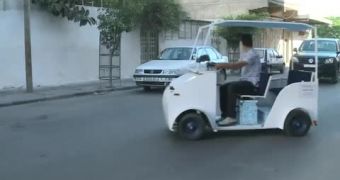It may not look like one of those cars that stand to turn one's neighbors green with envy, yet this electric vehicle recently built by a Palestinian man can sure take one places whilst causing little damage both to the environment and to one's finances.
32-year-old Munther al-Qassas, presently working as a taxi driver (in spite of having a degree in political sciences) explains how the major drive behind his decision to manufacture this electric car was the fact that, for the time being, Gaza is facing a severe fuel crisis.
Therefore, rather than standing in line for hours on end, hoping to get his hands on some petrol, he thought it worthwhile to take matters into his own hands and ditch his business' fuel addiction altogether.
Because the car was mostly built from recycled materials in a home-based workshop, final costs amounted to about $1,000 (€780).
As Inhabitat reports, the supporting frame for this car is made from wood, whilst its tires used to belong to a wheelbarrow.
On the downside, the car needs to be plugged into a power source for about five hours before it can be sent to roam the city streets, and it can only be driven for about four hours before it needs recharging.
Add to this the fact that it can only carry two people at a time, and that it can only reach the speed of 12 mph, and one could argue that, although highly innovative and praiseworthy, this vehicle hardly seems appropriate for use in crowded urban areas, where speed and efficiency are of utmost importance.
Presently, Munther al-Qassas is hoping that more people in Gaza will soon follow his example.
Moreover, he supposedly has plans of taking things one step further and manufacture one similar vehicle that can run on solar energy alone, and therefore render run-off-the-mill power outlets useless.
“I would like to make Gaza self-sufficient with this electric car, or even build a solar car. I’m sure if I was in a different country, I would have received more attention and I would have won some awards for what I do,” Munther al-Qassas told members of the press.

 14 DAY TRIAL //
14 DAY TRIAL //